
Geoffrey O'Hara was a Canadian-American composer, singer and music professor.
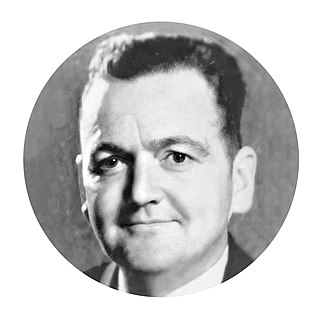
Howard Johnson was a song lyricist. He was inducted into the Songwriters Hall of Fame in 1970.

"K-K-K-Katy" is a World War I-era song written by Canadian-American composer Geoffrey O'Hara in 1917 and published in 1918. The sheet music advertised it as "The Sensational Stammering Song Success Sung by the Soldiers and Sailors", as well as "The Sensational New Stammering Song" The song was first played at a garden party fund-raiser for the Red Cross in Collins Bay on Lake Ontario. O'Hara was from Chatham, Ontario, and taught music at several universities.
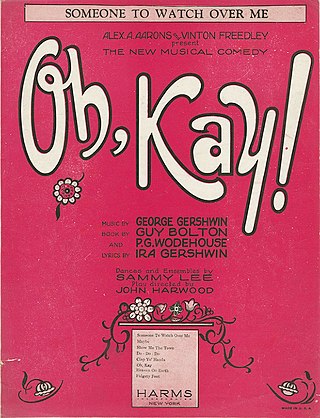
"Someone to Watch Over Me" is a 1926 song composed by George Gershwin with lyrics by Ira Gershwin, assisted by Howard Dietz who penned the title. It was written for the musical Oh, Kay! (1926), with the part originally sung on Broadway by English actress Gertrude Lawrence while holding a rag doll in a sentimental solo scene. The musical ran for more than 200 performances in New York and then saw equivalent acclaim in London in 1927, all with the song as its centerpiece. Lawrence released the song as a medium-tempo single which rose to number 2 on the charts in 1927.

Philander Chase Johnson (1866–1939) was an American journalist, humorist, poet, lyricist, and dramatic editor. At the time of his death, he had been a Washington Evening Star staff member for 47 years. Prior to joining the Evening Star, he had been an editorial writer for The Washington Post.

Joseph Edgar Howard was an American Broadway composer, lyricist, librettist, and performer. A famed member of Tin Pan Alley along with wife and composer Ida Emerson as part of the song-writing team of Howard and Emerson, his hits included "Hello! Ma Baby" and Broadway musicals like "I Wonder Who's Kissing Her Now?".
George William Meyer was an American Tin Pan Alley songwriter. He was born in Boston, Massachusetts, in 1884. He graduated from Roxbury High School, and began working in accountancy for Boston department stores, before moving to New York City in his mid-20s.

"The Sunshine of Your Smile" is a British popular song published in London in 1913 just before the First World War by Francis, Day and Hunter. The lyrics were by Leonard Cooke and the music by Lilian Ray. It became a top ten hit on the UK Singles Chart in 1980, sung by Mike Berry.
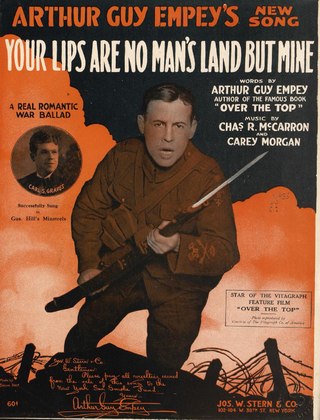
"Your Lips Are No Man's Land But Mine" is a World War I war song. It became a hit in 1918 when released by Henry Burr & Albert Campbell, charting peaking at #2 in the United States.

"They Were All Out of Step But Jim" is an American World War I war song written by Irving Berlin. It rose to popularity in 1918 when released by Billy Murray, charting at No. 3 in the United States.

"Au Revoir, but not Good Bye: Soldier Boy" is a 1917 song composed by Albert von Tilzer, with lyrics written by Lew Brown.

Just a Baby's Prayer at Twilight (For Her Daddy Over There) is a 1918 song composed by M.K. Jerome, with lyrics written by Sam M. Lewis and Joe Young. The song was published by Waterson, Berlin & Snyder Co. The song was performed by Henry Burr and reached number one on the top 100 US songs of 1918. Burr's recording sold a million copies in sheet music and sales.
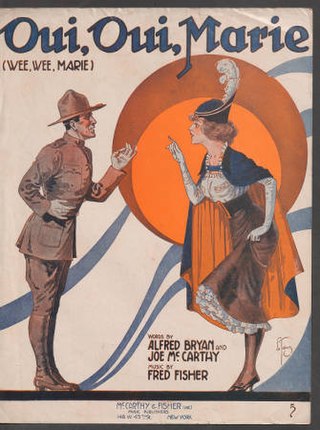
Oui, Oui, Marie is a 1918 song composed by Fred Fisher with lyrics written by Alfred Bryan and Joe McCarthy. It was published by McCarthy & Fisher Inc. The sheet music cover featured an illustration by Andre De Takacs. The song was in the top 20 charts from September 1918 to February 1919 and reached number 10 in December. It was recorded by Arthur Fields, Irving Kaufman, and Rachel Grant & Billy Murray. The sheet music can be found at the Pritzker Military Museum & Library.
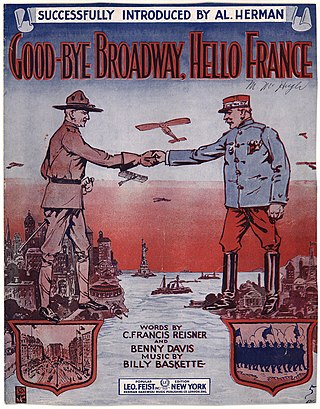
Good-Bye Broadway, Hello France is a 1917 song composed by Billy Baskette, with lyrics written by C. Francis Reisner and Benny Davis. The song was published by Leo Feist, Inc.

"Just Like Washington Crossed the Delaware, General Pershing Will Cross the Rhine" is a 1918 song composed by George W. Meyer, with lyrics written by Howard Johnson and published by Leo Feist, Inc.

The cover has George Washington, Betsy Ross, and her helper.

"Calling Me Home To You" is an American song written by Edward Teschemacher and composed by Francis Dorel. The song was first recorded on May 31, 1916, by Alfred De Manby, a baritone vocalist, for Columbia Records.
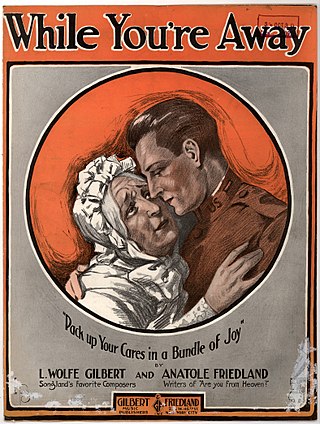
While You're Away (Pack Up Your Cares in a Bundle of Joy) is a World War I song released in 1918. L. Wolfe Gilbert and Anatole Friedland composed the music and lyrics. It was published by Gilbert & Friedland Inc. The song was performed by Harry Ellis; and also by The Peerless Quartet. In October 1918, it reached the number five spot on the US song charts. In December 1918, the song reached a peak position of number two on Top 100 US Songs of that year.

"My Sweetheart Is Somewhere in France" is a World War I era song first released in 1917. Mary Earl composed the music and wrote the lyrics. Shapiro, Bernstein & Co. Inc. of New York City published the song. Elizabeth Spencer performed a version of the song that was released by the Victor record label.

"Tom, Dick and Harry and Jack " is a World War I era song released in 1917. Howard Johnson wrote the lyrics. Milton Ager composed the music. The song was published by Leo Feist, Inc. of New York City. Artist Henry Hutt designed the sheet music cover. It features four men in different service uniforms with an inset photo of either Jack Connors, Jr. or Bailey and Cowan. The inset photo varies by edition. It was written for both voice and piano.



















